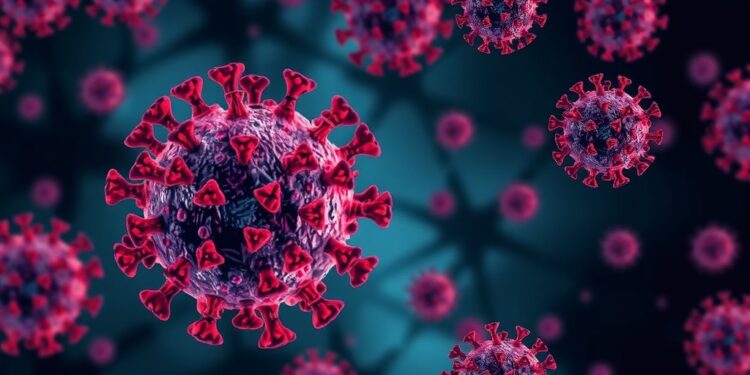Type I interferons are pivotal proteins produced by the cells of the immune system in response to viral infections. They act as sentinel molecules, orchestrating the initial defense against invading pathogens. As part of the innate immune response, these proteins relay critical signals that prepare neighboring uninfected cells to defend themselves against potential viral threats. This pre-emptive action is vital for limiting the spread of disease, particularly in vulnerable populations. Yet, emerging research reveals a significant challenge faced by some individuals, particularly those over the age of 65, where autoantibodies against these very interferons can severely impair immune function. With an estimated 100 million elderly individuals worldwide harboring these neutralizing antibodies, the implications for public health, especially concerning susceptibility to severe viral infections such as influenza and COVID-19, is alarming.
The identification of individuals with autoantibodies to type I interferons has significant ramifications. These antibodies essentially obstruct the immune response, inhibiting the body’s ability to effectively combat viral infections. Individuals affected by this immune dysfunction may find themselves at an increased risk of severe outcomes from otherwise manageable viral diseases, including highly transmissible viruses like influenza and COVID-19. The absence of specific therapies to combat this growing concern intensifies the urgency for innovative research and therapeutic options in a landscape where viral respiratory illnesses pose ongoing threats.
In an insightful study led by researchers from the University of Zurich, the intricate molecular mechanics behind how pathogenic autoantibodies interact with and inhibit type I interferons have been illuminated. The research team, under the guidance of Professor Benjamin Hale at the UZH Institute of Medical Virology, aimed to leverage this newfound understanding to develop therapeutic "decoy" molecules. These artificial constructs could potentially bind to the pathogenic autoantibodies, blocking their ability to inhibit genuine type I interferons and thereby restoring a robust immune defense. This innovative approach could pave the way for revolutionary therapies aimed at lifting the immune blockade created by autoantibodies and protecting vulnerable populations from severe infections.
Utilizing a biobank of blood samples, the researchers focused on individuals previously diagnosed with autoantibodies against type I interferons. The study included samples from participants who had experienced severe COVID-19 complications and required intensive care admission. This access to real patient data brought invaluable insights into the pathogenic mechanisms at play, revealing the binding specifics of autoantibodies and their functional domains. Such data collection is instrumental in guiding the development of targeted therapies and deepening the understanding of these immunological phenomena.
The researchers meticulously mapped the "molecular footprints" of type I interferons, identifying the precise regions recognized by autoantibodies. This mapping allowed for the design of lab-created molecules that mimic the structure of natural interferons without triggering hyperactivation of immune responses. The new decoy molecules represent a groundbreaking concept, offering a promising avenue of investigation for countering the detrimental effects of autoantibodies.
Through rigorous cell culture experiments, the team demonstrated the efficacy of these engineered decoys in reducing the inhibition caused by autoantibodies. By binding to these rogue antibodies, decoys restored the antiviral function of type I interferons against a variety of viral challenges, including influenza. This marked a pivotal moment in research, suggesting that the application of such decoy molecules could enhance immune responses without indiscriminately depleting other essential antibodies required for fighting infections.
The potential future applications of these decoy molecules extend beyond mere experimental findings. With the ability to selectively remove pathogenic autoantibodies from blood samples, researchers envision a revolutionary approach to therapies like plasmapheresis, a procedure aimed at filtering components from the blood. The introduction of decoy molecules could refine this treatment modality, focusing specifically on neutralizing harmful autoantibodies while preserving the vital immune components necessary for robust infection control.
As promising as these findings are, researchers acknowledge that this work serves primarily as a proof of concept. While initial data demonstrate the feasibility of designing these decoy molecules, further optimization and testing are essential to ensure their safety and efficacy in clinical contexts. The transition from laboratory studies to clinical investigations represents a critical step in realizing the goal of limiting susceptibility to viral diseases among affected individuals.
In conclusion, the groundbreaking research emerging from the University of Zurich provides a powerful glimpse into the future of immunotherapeutics for those with type I interferon autoantibodies. With a clearer understanding of the molecular mechanisms behind autoantibody interactions, the creation of targeted decoy therapies embodies hope for individuals at heightened risk of severe viral infections. The ongoing need for innovative solutions in the realm of infectious disease underscores the importance of such findings, which may ultimately change the trajectory of treatment for populations struggling with immunological vulnerabilities.
As this research continues to evolve, the scientific community remains hopeful for the development of therapeutic modalities that could significantly improve health outcomes for millions worldwide. The commitment to understanding the pathophysiology of autoimmune processes, coupled with advancements in molecular design, paints an optimistic picture for the future of infectious disease management.
Subject of Research: Type I interferon autoantibodies
Article Title: Type I interferon autoantibody footprints reveal neutralizing mechanisms and allow inhibitory decoy design
News Publication Date: 20-Mar-2025
Web References: Journal of Experimental Medicine
References: Available upon request.
Image Credits: University of Zurich
Keywords: type I interferons, autoantibodies, immune system, viral infections, COVID-19, influenza, therapeutic decoys, biobanks, molecular mechanism, plasmapheresis, immunology, innate immune response.




